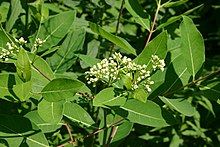Wildlife Gardening/Taxon/Apocynum cannabinum

Apocynum cannabinum also known as Indian hemp or dogbane an herbaceous plant widely distributed across North America. It can be found from southern Canada south through the continental United States, especially in coarse, moist soils. It serves as a host plant to hummingbird moths and provides nectar for many other insects.
All parts of the plant are poisonous and can cause cardiac arrest if ingested. It is also toxic to dogs and livestock.
Nomenclature
[edit | edit source]Apocynum cannabinum (dogbane, amy root, hemp dogbane, prairie dogbane, Indian hemp, rheumatism root, or wild cotton).
Apocynum album,
A. angustifolium,
A. arenarium,
A. bebbianum,
A. bolanderi,
A. breweri,
A. canadense,
A. carolinii,
A. cervinum,
A. cinereum,
A. cordigerum,
A. cuspidatum,
A. densiflorum,
A. dictyotum,
A. dimidiatum,
A. estellinum,
A. farwellii,
A. greeneanum,
A. hypericifolium,
A. isophyllum,
A. ithacense,
A. laurinum,
A. littorale,
A. longifolium,
A. macounii,
A. missouriense,
A. myrianthum,
A. nemorale,
A. neogeum,
A. nevadense,
A. oblongum,
A. oliganthum,
A. palustre,
A. piscatorium,
A. platyphyllum,
A. procerum,
A. pubescens,
A. purpureum,
A. salignum,
A. sibiricum,
A. subuligerum,
A. suksdorfii,
A. thermale,
A. tomentulosum,
A. venetum,
Cynopaema cannabinum,
Cynopaema hypericifolium,
Forsteronia pavonii,
Description
[edit | edit source]Apocynum cannabinum grows up to Template:Cvt tall. The stems are reddish and contain a milky latex capable of causing skin blisters. The leaves are opposite, simple broad lanceolate, Template:Cvt long and Template:Cvt broad, entire, and smooth on top with white hairs on the underside. It flowers from July to August, has large sepals, and a five-lobed white corolla. The flowers are hermaphrodite (have both male and female organs) and are pollinated by moths and butterflies.[1]
Gallery
[edit | edit source]-
Egg
-
Close-up of egg just prior to hatching
-
Caterpillar
-
Chrysalis
-
An adult male.
-
Ventral side of wings
Identification
[edit | edit source]See dedicated page: Identification
The monarch is closely related to several similar-looking butterfly species whose ranges abut or overlap with its own. It also has a Müllerian mimic, the viceroy, whose similar toxicity and coloration discourages predators from hunting either species.
| Taxa similar to monarchs | |||||||
|---|---|---|---|---|---|---|---|
| Similar caterpillar | Similar chrysalis | Similar adult | Distinctions | ||||
 |
 |
 |
Brief note on connection between taxon and article taxon, caterpillar distinctions, chrysalis distinctions, adult distinctions. | ||||
Encourage
[edit | edit source]Discourage
[edit | edit source]Antagonistic arthropod taxa
[edit | edit source]| Antagonistic arthropods of monarchs | |||||||
|---|---|---|---|---|---|---|---|
| Taxon | Behavior | Food | Reproduction | Safety | Water | Notes | |
 |
|
|
|
|
|
The Asian ladybeetle will eat very young caterpillars as both larvae and adults.[2] Information on native range or any other factor that might influence monarchs' likelihood of attracting this species to a garden. | |
 |
|
|
|
|
|
A variety of wasps will prey upon caterpillars.[3] Information on native range or any other factor that might influence monarchs' likelihood of attracting this species to a garden. | |
 |
|
|
|
|
|
Preys upon caterpillars and avoids being poisoned by not eating its prey's digestive tract and the processed milkweed material it contains.[4] Information on native range or any other factor that might influence monarchs' likelihood of attracting this species to a garden. | |
Utilize
[edit | edit source]For taxa whose presence in the garden is encouraged without being harmed by article taxon use tables like above but from the pov of the attracted taxon
| Beneficiary lepidopterans of Indian hemp | |||||||
|---|---|---|---|---|---|---|---|
| Taxon | Behavior | Food | Reproduction | Safety | Water | Notes | |
 |
|
|
|
|
|
Caterpillar host plant.[citation needed] Information on native range, cultivation requirements, bloom time and any other criteria that might lead a gardener to select this species over the others. | |
 |
|
|
|
|
|
Nectar source.[5] Information on native range, cultivation requirements, bloom time and any other criteria that might lead a gardener to select this species over the others. | |
 |
|
|
|
|
|
Caterpillar host plant.[citation needed] Information on native range, cultivation requirements, bloom time and any other criteria that might lead a gardener to select this species over the others. | |
 |
|
|
|
|
|
Caterpillar host plant.[citation needed] Information on native range, cultivation requirements, bloom time and any other criteria that might lead a gardener to select this species over the others. | |
 |
|
|
|
|
|
Caterpillar host plant.[citation needed] Information on native range, cultivation requirements, bloom time and any other criteria that might lead a gardener to select this species over the others. | |
 |
|
|
|
|
|
Caterpillar host plant.[citation needed] Information on native range, cultivation requirements, bloom time and any other criteria that might lead a gardener to select this species over the others. | |
References
[edit | edit source]- ↑ Invalid
<ref>tag; no text was provided for refs namedpfaf - ↑ Koch, R. L.; W. D. Hutchison; R. C. Venette; G. E. Heimpel (October 2003). "Susceptibility of immature monarch butterfly, Danaus plexippus (Lepidoptera: Nymphalidae: Danainae), to predation by Harmonia axyridis (Coleoptera: Coccinellidae)". Biological Control. 28 (2): 265–270. doi:10.1016/S1049-9644(03)00102-6.
- ↑ Zalucki, Myron P.; Malcolm, Stephen B.; Paine, Timothy D.; Hanlon, Christopher C.; Brower, Lincoln P.; Clarke, Anthony R. (2001). "It's the first bites that count: Survival of first-instar monarchs on milkweeds". Austral Ecology. 26 (5): 547–555. doi:10.1046/j.1442-9993.2001.01132.x.
- ↑ Rafter, Jamie; Anurag Agruwal; Evan Preisser (2013). "Chinese mantids gut caterpillars: avoidance of prey defense?". Ecological Entomology. 38 (1): 78–82. doi:10.1111/j.1365-2311.2012.01408.x.
- ↑ Iftner, David C.; Shuey, John A. and Calhoun, John C. (1992). Butterflies and Skippers of Ohio. College of Biological Sciences and The Ohio State University. ISBN 0-86727-107-8
Associated Wikimedia for Apocynum cannabinum | |||||||||||||||
|---|---|---|---|---|---|---|---|---|---|---|---|---|---|---|---|
| Commons | Wikipedia | Wiktionary | |||||||||||||
| Gallery Category |
Article |
Definition |
|||||||||||||
| Media | Encyclopedia | Dictionary | |||||||||||||






